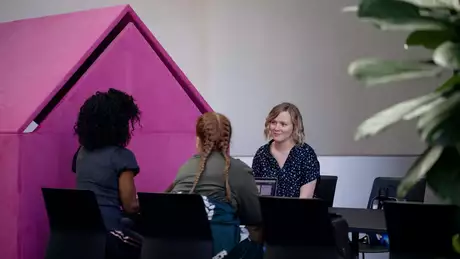
Continued support for Arcada's research in child-robot interaction
Published: 06.02.2025 / Research
Arcada has been granted 140,000 euros from the foundation Brita Maria Renlunds minne to deepen its research in how social humanoid robots can be of use in early childhood education in a safe and pedagogical way.
Already in 2022, Arcada started research how humanoid robots and technology can be integrated in an ethical and sustainable way, as part of Swedish-language early childhood education. This, as a response to the fact that the curriculum for early childhood and care stipulates that digital tools should be included in the everyday life of daycare centres. Thanks to continued support, the research will now provide insight and knowledge on how to integrate digitalisation in a versatile and sustainable way, for daycare children and staff.
Knowledge boost for future early childhood professionals
The interdisciplinary research project involves experts in engineering, behavioural, and pedagogical sciences, the social and healthcare bachelor programme in Swedish, as well as partners in early childhood education.
“As the Finnish National Agency for Education encourages daycare centres to use digital tools to promote children's creativity, cooperation and basic reading skills, we want to pave the way for this through our research, and via our social and healthcare bachelor programme in Swedish”, says Eva Edgren, lecturer in social work.
Research shows that social humanoid robots can have beneficial effects on children's learning, social behaviour, psychological well-being, motivation and concentration.
“Therefore, we want to study how robotics can benefit early childhood education in Swedish-speaking Finland,” says project manager Christa Tigerstedt, PhD in pedagogy, referring to the linguistic and cultural specificity of the Finland Swedish context.
From decision-makers to end-users – research provides knowledge all the way
The research involves different target groups in the early childhood education field, such as daycare centre staff, managers and decision-makers. Among these, some are end users of the digital solutions, while others are responsible for creating the conditions for new solutions to be implemented in Swedish-speaking daycare centres.
“Daycare staff need both the skills and the will to use technological tools in their work, while managers and decision-makers enable the increased digitisation of early childhood education to be realised in the long run. Through the research in child-robot interaction, we aim to spread knowledge throughout the field and increase technological understanding” says Tigerstedt, emphasising the importance of a human-centred perspective where robots are seen as a complement to the work of early childhood educators.
Earlier this year, Arcada was also awarded funding from Konstsamfundet of 18,000 euros for a robot film project aimed at children, and a project to develop a Finland Swedish AI voice.
Press release by Stiftelsen Brita Maria Renlunds minne 29.1.2025 (in Swedish): Stiftelsen Brita Maria Renlunds minne beviljar 13,5 miljoner euro till organisationer som jobbar för barns och ungas välmående External link.


